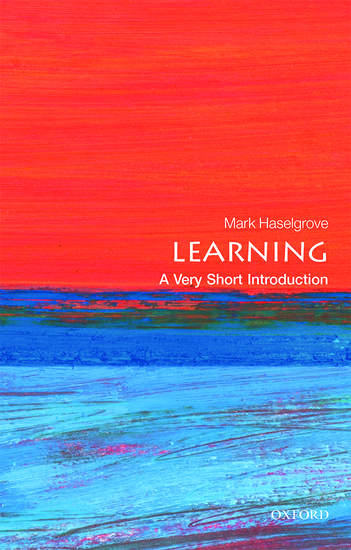Home >
A Very Short Introduction >
Learning (Psychology)
A Very Short Introduction | Psychology
Learning
ISBN: 9780199688364
Series: A Very Short Introduction
Learning (Psychology)
A Very Short Introduction Learning (Psychology) Media > Books > Non-Fiction > Education Books Expect Delays of Up to 4 Weeks| Order Below |
ISBN
9780199688364 (10-digit ISBN: 0199688362)
- Description
- Key Features
- Series Description
- Table of Contents
- Discusses the centrality of learning to our lives, and its role in memory, language and intelligence
- Considers the significance of learning to survival for animals, who need strategies to recognize changes in their environment, both opportunities and threats, and to respond appropriately
- Comments on psychology experiments and recent studies in the field of learning
What is learning? How does it take place? What happens when it goes wrong? The topic of learning has been central to the development of the science of psychology since its inception. Without learning there can be no memory, no language and no intelligence. Indeed it is rather difficult to imagine a part of psychology, or neuroscience, that learning does not touch upon. In this Very Short Introduction Mark Haselgrove describes learning from the perspective of associative theories of classical and instrumental conditioning, and considers why these are the dominant, and best described analyses of learning in contemporary psychology. Tracing the origins of these theories, he discusses the techniques used to study learning in both animals and humans, and considers the importance of learning for animal behaviour and survival.
Oxford's Very Short Introductions series offers concise and original introductions to a wide range of subjects--from Islam to Sociology, Politics to Classics, Literary Theory to History, and Archaeology to the Bible.
Not simply a textbook of definitions, each volume in this series provides trenchant and provocative--yet always balanced and complete--discussions of the central issues in a given discipline or field. Every Very Short Introduction gives a readable evolution of the subject in question, demonstrating how the subject has developed and how it has influenced society. Eventually, the series will encompass every major academic discipline, offering all students an accessible and abundant reference library.
Whatever the area of study that one deems important or appealing, whatever the topic that fascinates the general reader, the Very Short Introductions series has a handy and affordable guide that will likely prove indispensable.
Please note: As this series is not ELT material, these titles are not subject to discount.
1: What is learning (and how do we study it?)
2: What is learned during learning?
3: The surprising thing about learning
4: Maps and clocks: Learning about space and time
5: When learning goes wrong
6: Learning from others
7: Surely there is more to learning than that
Further Reading
Index
What is learning? How does it take place? What happens when it goes wrong? The topic of learning has been central to the development of the science of psychology since its inception. Without learning there can be no memory, no language and no intelligence. Indeed it is rather difficult to imagine a part of psychology, or neuroscience, that learning does not touch upon. In this Very Short Introduction Mark Haselgrove describes learning from the perspective of associative theories of classical and instrumental conditioning, and considers why these are the dominant, and best described analyses of learning in contemporary psychology. Tracing the origins of these theories, he discusses the techniques used to study learning in both animals and humans, and considers the importance of learning for animal behaviour and survival.
Key Features
- Discusses the centrality of learning to our lives, and its role in memory, language and intelligence
- Considers the significance of learning to survival for animals, who need strategies to recognize changes in their environment, both opportunities and threats, and to respond appropriately
- Comments on psychology experiments and recent studies in the field of learning
Series Description
Oxford's Very Short Introductions series offers concise and original introductions to a wide range of subjects--from Islam to Sociology, Politics to Classics, Literary Theory to History, and Archaeology to the Bible.
Not simply a textbook of definitions, each volume in this series provides trenchant and provocative--yet always balanced and complete--discussions of the central issues in a given discipline or field. Every Very Short Introduction gives a readable evolution of the subject in question, demonstrating how the subject has developed and how it has influenced society. Eventually, the series will encompass every major academic discipline, offering all students an accessible and abundant reference library.
Whatever the area of study that one deems important or appealing, whatever the topic that fascinates the general reader, the Very Short Introductions series has a handy and affordable guide that will likely prove indispensable.
Please note: As this series is not ELT material, these titles are not subject to discount.
EASY ORDER FORM
PRICES LISTED INCLUDE CONSUMPTION TAX
Price Before Tax:
¥1,790


